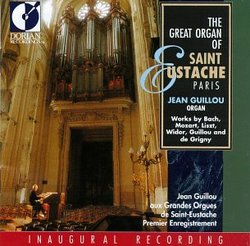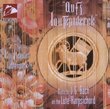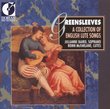| All Artists: Jean Guillou Title: St.Eustache Inaugural Members Wishing: 0 Total Copies: 0 Label: Dorian Recordings Release Date: 3/10/1993 Genre: Classical Styles: Chamber Music, Forms & Genres, Fantasies, Historical Periods, Baroque (c.1600-1750), Classical (c.1770-1830), Instruments, Keyboard, Symphonies Number of Discs: 1 SwapaCD Credits: 1 UPC: 053479013422 |
Search - Jean Guillou :: St.Eustache Inaugural
 | Jean Guillou St.Eustache Inaugural Genre: Classical
|
Larger Image |
CD DetailsSimilar CDs |
CD ReviewsThe strangest organ recital ever? Mark Swinton | 02/05/2002 (5 out of 5 stars) "Jean Guillou could be compared with the pianist Glenn Gould in some respects. He is an artist with his own unique ideas about performance practice: his registrations are unconventional, he pulls tempi about often to extreme degrees, he highlights (by means of solo stops) material that makes one pause and think - "Why have I never heard that in there before?" He plays entirely from memory (except his own compositions, and even with those he barely glances at the score whilst playing), and if memory lapses occur, he improvises in such a way that casual listeners never suspect that anything has gone wrong or that what they are hearing is not part of the piece they think they are hearing. His finger action is lightning-fast, and he dances on the pedals as if they were red-hot coals. Essentially, he re-interprets music in his own way, treating musical scores as little more than blueprints to vary and improvise upon as he sees fit. (It is worth noting that no-one - even one from among his pupils - has yet been able to imitate his playing convincingly.) And no matter where he performs (his recital career has taken him around the world and back again) he somehow manages to make the listener imagine that they are at home with him in Ste Eustache, by re-creating as nearly as possible the sound of that organ using the resources of the instrument set before him. Above all else, he is a deeply original musical thinker and an outstanding, living example of the French tradition of composer-organists, having studied with Dupré, Duruflé and Messiaen - two of the finest players and one of the most remarkable composers of the last century.This disc is probably the best with which to sample Guillou's work both as performer and as composer. It reproduces the programme of the concert he gave in Ste Eustache (where he has been titulaire for nearly four decades) in 1989 to mark the rebuilding of the organ by J. van den Heuvel - a rebuild, interestingly enough, that Guillou oversaw and into which he had considerable input.The programme reflects Guillou's enthusiasm for the music of J. S. Bach by including his best-known organ work (setting aside issues of true authorship that have recently arisen) - the Toccata and Fugue in D minor, BWV 565. Right from the start, there is evidence of Guillou's quirky mind at work: the famous opening flourishes and spread diminished seventh chords are dispensed with very rapidly; the florid runs are taken more slowly and with a lot of detached playing (as opposed to the smoothness adopted by most organists for such passages). In the fugue, taken at a considerably fast tempo, there are numerous manual changes and surprising registrations; most notably, in the echo passages he plays about with delicate high flute sounds. Nicholas de Grigny's "Récit de Tierce en taille" is a typical representative of the French Baroque, and is played discreetly here, but still with much manipulation of tempo and momentum. Mozart's Fantasia in F minor bristles with energy and is subjected to similar 'creative' registrations as the Bach; the first movement of Widor's celebrated Fifth Symphony appears to rise and fall like waves ebbing as Guillou explores previously unseen nuances in the music, the result being that the work sounds more athletic than Romantic! To those who already know this music, these performances are guaranteed to be something of a surprise, or even a shock. However, on listening Guillou's own symphonic work "Hyperion," the listener can appreciate most of the unusual treatments given to the other music. "Hyperion" is a prime example of the extraordinary creative energy of this artist, as it is themed around the subject of "Fire" - defined by Guillou in his liner notes in metaphysical and philosophical terms, as well as depicting fire in the literal sense. The first and last movements ("Hermes" and "Agni-Ignis") are bold toccatas: the one being playful and full of contrast, the other being fierce and aurally shattering. The second movement is a melody that echoes the sort of thing one hears in the de Grigny work, flanked by austere motifs and a profound sense of mystery. The third movement is even more mysterious, taking a journey into the "Inflamed Soul" and exploring the full range of colours available on the magnificent Ste Eustache organ. This is by no means easy listening, but it is a sound world that etches itself into the mind and proves irresistable to all who like it to any degree.The programme ends with a display of organ virtuosity that puts even Guillou's composition to shame. There are many recordings of Liszt's "Fantasia and Fugue on BACH," but none like this. The work exists in three versions: a first version for organ that is full of dazzling displays, a second version for organ in which Liszt purged some of those fireworks, and a third version re-composed with new fireworks and adapted for piano. Most organists play the second version as the "standard" one; some brave ones take on the challenge of the first version; a few pianists have tackled the piano version in like manner. On this disc, Guillou transcends them all by performing his own "syncretic" version, in which he skilfully transfers the pianistic effects of the third version to the original medium of organ. The result is horrifically difficult to play as a result of the transfer, but Guillou demonstrates the height of his virtuosity by making it sound effortless - and needless to say, his own quirks continue to emerge through the music so that the overall impression is that he is partly remembering and partly improvising the work. It is stunning beyond question.Purists may have a hard time with Guillou; organists will be enthralled and dumbfounded by his sheer brilliance - all the more remarkable since he is in his seventies! At the core, however, whilst this is one of the oddest organ recitals available on CD, it is also one of the most unique and recommendable.Jean Guillou: indisputably a master musician!" Guillou at Saint Eustache, Inaugural Recording NEIL W LARSON | Lafayette, California | 02/06/2000 (5 out of 5 stars) "In this recording, the great Jean Guillou inaugurates the brand new Van den Heuvel organ in the Church of Saint Eustache, Paris. The recording is excellent! Guillou gives a highly diverse program: from Bach to Guillou himself, and he gives equal treatment to all of the composers. I have never heard any of these pieces played better. The first movement of Widor's fifth symphony has never been played better than on this recording. Guillou shows of the magnificent organ wonderfully!"
|

 Track Listings (9) - Disc #1
Track Listings (9) - Disc #1


